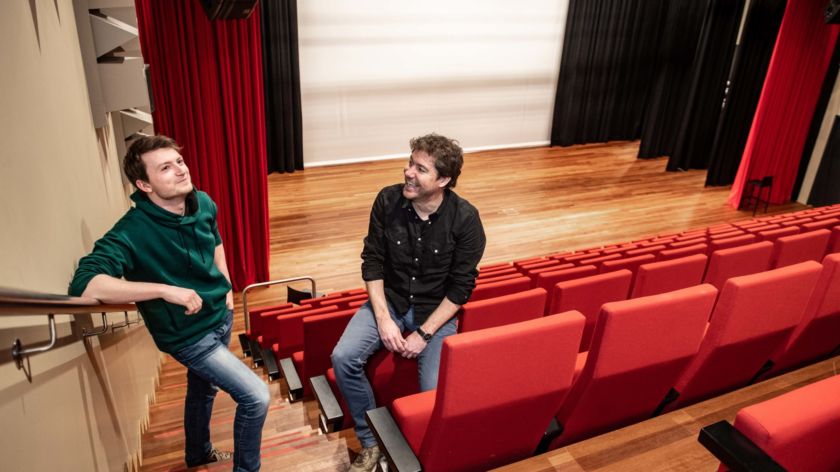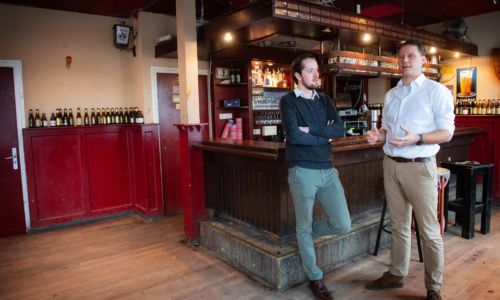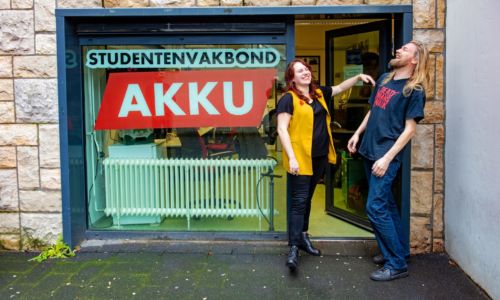Everything was better in the old days. Right? (3): Cultuur op de Campus
-
 Jory Strijbos and Pim Franssen. Photo: Bert Beelen
Jory Strijbos and Pim Franssen. Photo: Bert Beelen
What the former President of Cultuur op de Campus (in those days known as the Studenten Programmeringscommissie) used to dream about twenty years ago was finally realised last year: a theatre hall on Campus.
Pim Franssen: ‘A theatre hall, that’s what we were fighting for in my day. A fight we always lost, until …’
Jory Strijbos: ‘Until last year. That’s when Theaterzaal C (in the Elinor Ostrom building, Eds.) opened its doors.’
PF: ‘It’s really turned out great! We used to stage performances at the Cultuurcafé. At the time, the podium was right in front of the bar. Lebbis and Janssen once did a show there. During the show, they said they were literally playing up against the bar. It was a really awkward set-up.’
‘Monty Python always attracted a full house!’
JS: ‘We still organise live music performances at the Cultuurcafé, but it’s almost impossible to perform theatre there.’
PF: ‘It was always a battle between culture and the beer drinkers. Is that still the case?’
JS: ‘Yes, that sounds very recognisable. We plan as many performances and shows as we can in Theaterzaal C, but we have to compete with the Radboud Reflects programmes. We often hear from students: That sounds like great fun, but I don’t have time!’
Who’s who?
Jory Strijbos (25), Master’s student in Health Care Psychology. President of Cultuur op de Campus 2018-2019.
Pim Franssen (43), cultural entrepreneur and Psychology lecturer. President of the Studenten Programmeringscommissie 1997-1998.
PF: ‘I think students do have less time than they used to. In my day we still got five years’ worth of student grant. And the university system has become much more school-like. I remember we were told at the start of a course: ‘This is the material, this is the book we’ll be reading, and this is the exam date. Good luck!’ Now you have to attend seminars every week, prepare for everything. It’s less flexible.’
JS: ‘That’s what we find when we look for committee members. Students say: I want to do it, but I don’t want to accrue any study delay, because I’ve also got a job on the side, and I’m already in debt. We’re already recruiting committee members for next year.’
PF: ‘Well, we certainly didn’t have to do that. Just before the summer, we’d be like: Oh yeah, we need a new committee by September. Maybe we should take action.’
JS: ‘We have to find interested people and start telling them now how much fun Cultuur op de Campus is, sow the seeds. Otherwise we won’t find anyone.’
PF: ‘What a pity! I think students should get an additional year for their studies, the way we did in my day. Let students figure out what they want to do with this time. Some may spend half of that year in the pub. It doesn’t matter. In the end, the gains will outweigh the costs.’
JS: ‘We also see the effect of lack of time in the number of visitors. The other day we staged a performance, Children of Aleppo, by George Tobal, a fantastic theatre-maker. It attracted no more than fifteen students.’
PF: ‘We also had performances that didn’t attract much of an audience.’
JS (laughs): ‘Phew! I was afraid it was just us doing a poor job!’
PF: ‘I can still remember a performance where only two people showed up, plus two committee members. It was absurdist literary theatre, amazing stuff! We had so much fun. But no one came.’
JS: ‘We also have our successes: the film Fantastic Beasts was sold out.’
PF: ‘We used to attract a full house whenever we screened a Monty Python film.’
JS: ‘I shouldn’t complain. We’ve got ourselves a good deal, with a great office and a beautiful theatre hall.’
PF: ‘And don’t forget that it’s such fun work! And you learn a lot from it. I’m a good example of that: in the end, culture became my profession.’


